SDGs Interviews: Talking Good Health and Well-Being with Fortunate Collins

SARAYA is one of Japan’s leading companies that implement the United Nations Sustainable Development Goals (SDGs). This is the twelfth chapter of SARAYA’s SDG interview series telling the story of those behind SARAYA and how they are working to achieve these goals. In this edition, we spotlight Mr. Fortunate Collins, general manager of Saraya Uganda, and discuss the health and well-being of Uganda and its inhabitants, tackling SDG number 3: Good Health And Well-Being.
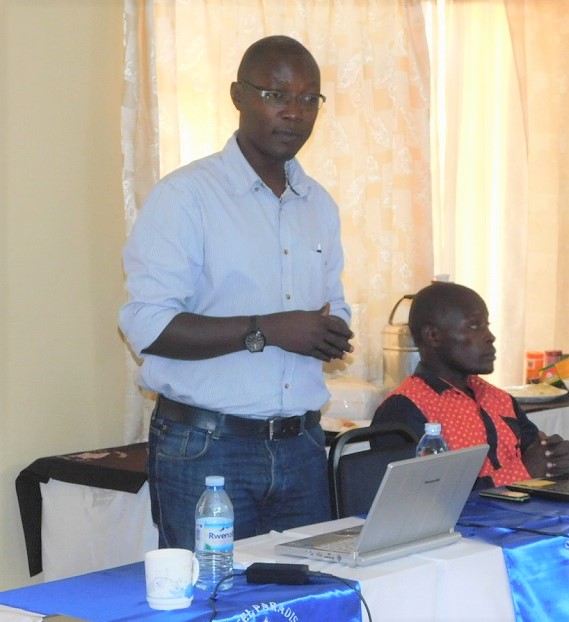 |
|
Could you tell us about your background?
I was born into a family of 3 boys in Nairobi, Kenya, to Ugandan parents. My father worked as an airline administrator in Nairobi, the reason why my childhood dream was to become a pilot, while my mother was a primary school teacher and we lived in that city until I was 15 years old, excluding a bit more than 3 years where we lived in the UK, period I attended pre-primary school. Later, we moved to Uganda, where I went to secondary, high school and undergraduate studies at Makelele University, the biggest and second oldest university in East Africa, established in 1924. Although I studied social sciences and communications there, I continued my studies pursuing a marketing course in marketing with the Chartered Institute Of Marketing (CIM-UK) and graduated as a professional Marketer in 2013, and a Master’s in Strategic Planning with Edinburgh Business School of Scotland, UK, both online courses while working in Uganda.
My work experience started with banking, working as a corporate sales representative at Crane Bank handling the company’s overall operations and general communication. Afterward, I shifted to the fast-moving consumer goods industry and worked for Uganda Breweries Limited, a beer brewing company part of Diageo International, the British multinational beverage company, as a customer relations representative. I had a chance to join the launching and branding of Tusker Light, the lighter version of the most popular beer in East Africa, spending 8 months in Kenya researching its formula and then back in Uganda working. But working in the beer industry means working late at night since that is when bars are open. I had a family, but I was not spending enough time with my son. To have a better life balance, I decided to find another job and started working at Unilever, which sold laundry detergents, foods, and personal care products in the country, as a territory sales manager for 4 years. It was a good experience and I learned to manage a business and different segments of business, like wholesale.
In November 2016, I was contacted through a Recruitment Agency about an opportunity at Saraya Uganda as Head of Sales and Marketing. I had never heard about Saraya or their products, but when I found out about the job description, I decided to go for it and find out more about the company and its products, because they have interesting hygiene products. After the interviews, I joined Saraya as Head of Sales and Marketing on 21st February 2017. The 2 companies I previously worked with were huge multinational companies that everyone knew, with room for limited growth. Saraya had a great company vision and their products, mainly hand sanitizers, were new to many people. I thought I could give it a try and grow with the company and make Saraya to be recognized in the country.
Most of my work experience has been in the areas of sales, marketing, business development, and customer relations. This made my marketing qualifications stronger. However, in preparation for more senior management, I opted to study strategic planning to help me with the skills required to manage organizations and companies better.
What is your role at SARAYA?
Currently, I am the general manager at Saraya Uganda, responsible for the company's overall operations, overseeing strategic objectives, goal setting, team recruitment and motivation, factory operations, and other responsibilities. At the same time, I am in charge of sales and marketing activities, which include target setting, product launches, customer acquisition and management, and many other roles.
My goal with Saraya is to see SARAYA establish itself as the leading company in public and medical hygiene solutions in not only the country but the region where it is. I would like to see Saraya out-compete other companies, and become a host of local ones as the leading provider of public and medical solutions.
I am, personally, very proud that people call hand sanitizers “Saraya” in Uganda. Hand sanitizer was a new concept in Uganda and we did a lot of activities in hospitals to make ourselves known as the only true hand sanitizer manufacturer in Uganda. Now you can find them at hospitals, airports, and many other places, with the hand sanitizer “Alsoft V” becoming a household name.
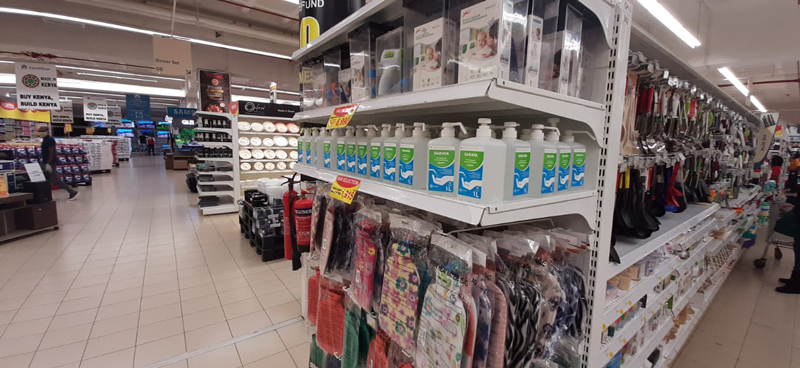 Alsoft V is also sold in Kenyan supermarkets.
Alsoft V is also sold in Kenyan supermarkets.
So far the role is interesting but challenging. It has been a challenge to make people appreciate the products that Saraya offers because the concepts were new to Uganda but equally rewarding that we are now the go-to company when it comes to reliable hand hygiene products. Our challenge is now to make other products, like Lakanto the natural sweetener, become household names in Uganda and the region as a whole.
SDGs number 3, Good Health and Well-being. What role does Saraya Uganda play in achieving it?
As the only company that manufactured alcohol-based hand sanitizers in Uganda since 2010, Saraya has greatly contributed to the improvement of the general health of people visiting hospitals in Uganda, our main pillar of existence in the country. We pioneer the alcohol-based hand sanitizer market with the latest technologies and research, including automatic dispensers that avoid the need for touch, great for infection prevention. We provide the best alcohol-based hand rub in the region (Alsoft V), together with free lectures on how to improve the general well-being of medical professionals and communities. As examples of this last point, we have conducted lectures in government and private Hospitals about how to reduce nosocomial infections and their financial toll both on the patient and the healthcare systems. We also conducted research in 2014 in Gombe hospital, in its neonatal & maternity wards, demonstrating that consistent use of alcohol-based hand rub can reduce sepsis within mothers. Also, we have had lectures in secondary schools to educate them about the benefits of hand hygiene.
In terms of donations, over the years we have made several donations of dispensers, hand wash, and sanitizers. For example, working with an NGO called Peace winds, we conducted lectures together with hand washing equipment donations to the Bidi Bidi Refugee Camp in Yumbe, which hosts many refugees from South Sudan. SARAYA has played a great role in health crises like Ebola and Covid-19, as we were the only sanitizer Manufacturer in Uganda, and one of the very few within the East African Region. Every time the region has had a medical emergency (a pandemic), Saraya Uganda was the only option people would run to, like when in 2017-18 our hand sanitizers were used by the Ministry of Health in the fight against the Ebola outbreak. In the same season, we had very big exports to Western Congo as well for the same reason. In 2021, working with the Ministry of Health and the Japan International Cooperation Agency (JICA), we sold sanitizer for over $320,000 USD to be used as the Covid-19 Response.
Our role as a sanitation provider company is to be key opinion leaders in infection prevention and control (IPC) and general public health, using the latest research from credible information authorities like the World Health Organisation.
We do all this not only as an international company but also as a local one, producing locally with the Saraya Manufacturing (U) Ltd factory situated inside the Kakira Sugar Limited premises in Kakira-jinja, the biggest sugar manufacturer in East Africa. Thanks to a joint venture with the Madhvani Group, operators of the Karira sugar state, we are next to our most important raw material in order to make ethanol, a collaboration that we want to extend for many years.
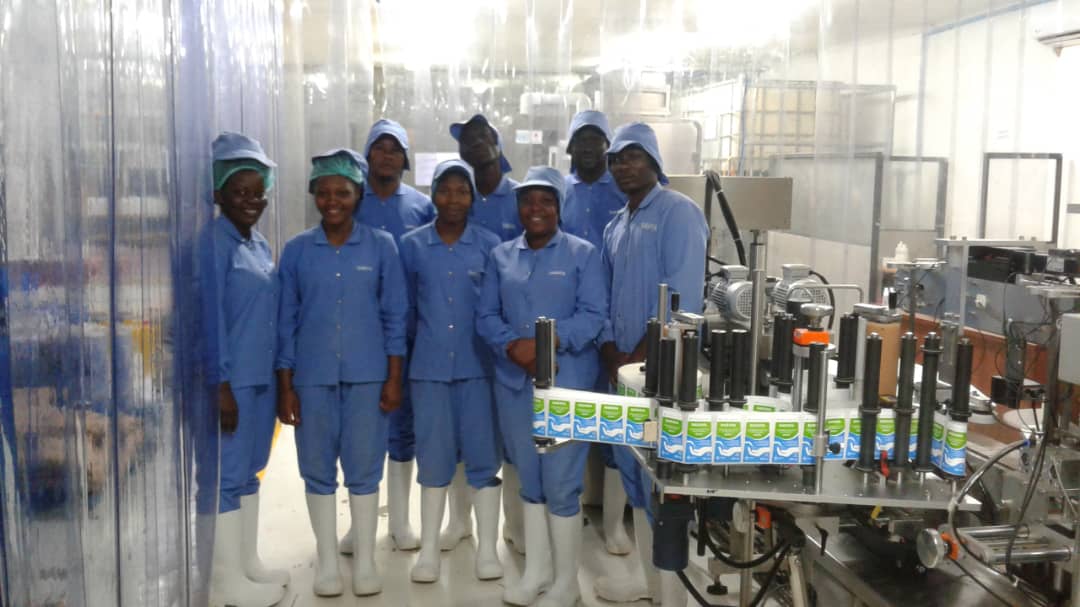 Photo of the team working inside the manufacturing factory.
Photo of the team working inside the manufacturing factory.
The provision of other healthy products, like Lakanto, also goes a long way in improving the general well-being of people.
2019 must have been a hard year. How did Saraya Uganda face the Covid 19 Pandemic?
Like many businesses across the world, we were not prepared for the pandemic.
We faced a shortage of production materials like allantoin, an anti-irritation ingredient used in some of our products which we get from Japan and China, as well as packaging materials because our local supplier could not meet the increased demand. All this was beside the reduced manpower we were suffering since some staff had to stay home because of the lockdown.
Our response to the challenges involved several, distinct actions. For the issue of packaging materials, we had to resort to importing some from outside of Uganda. For instance, we got 20,000 one-liter bottles from Vietnam to supplement our local supplier. Additionally, we got a new mold tool and gave it to a different manufacturer, making it so that we have 2 suppliers of the 1-liter bottle. In another case, when we ran out of the packaging materials of the 20 liters, BiB (bag in the box) bags from Japan, we resorted to using jerry cans that we got locally to ensure we continue supplying the market.
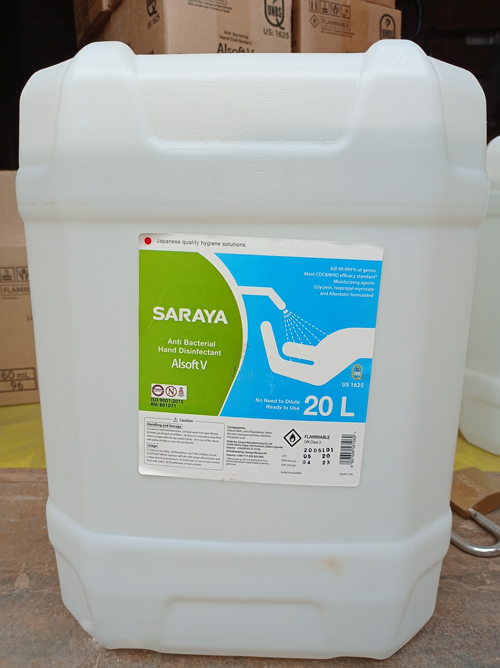 Example of the jerrycans used during the lack of packaging materials.
Example of the jerrycans used during the lack of packaging materials.
For the lack of chemical ingredients like allantoin, we got some shipped from China through DHL, but since most planes were not flying at the time, we still received it late but at least we continued with production.
Regarding the shortage of staff due to the lockdown, we finally accessed government stickers that were being given to "Essential Service Providers". These were few so only 5 of us were able to work, which together with shorter working hours due to curfew meant that our production was severely limited. Working to ensure supply, even from home after general working hours, was not rare.
What are your future plans regarding SDG number 3?
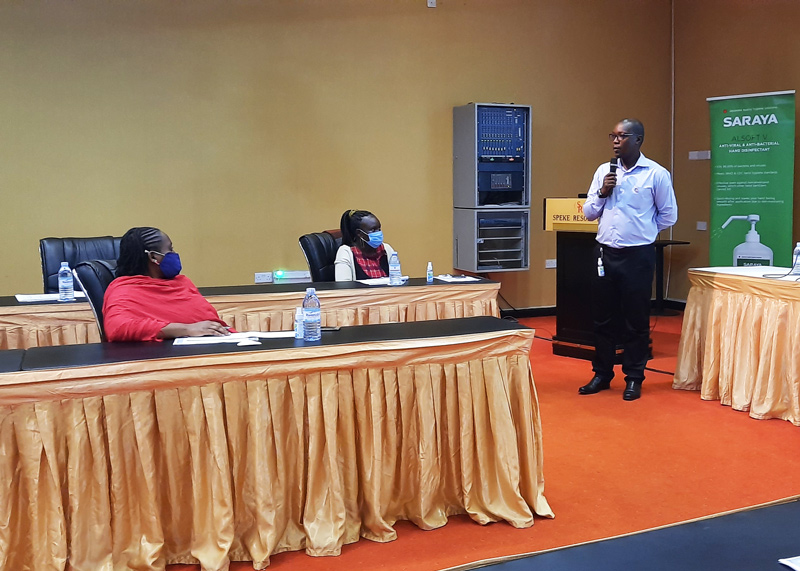 Mr. Collins addressed participants at one of the UNIDO training events where SARAYA participated.
Mr. Collins addressed participants at one of the UNIDO training events where SARAYA participated.
SDG 3 is very close to our very existence. We will improve on our position as healthcare providers, with the continuation of research, support through donations, lectures, and seminars, while furthering our commitment to healthy lives with innovative products like Lakanto, our monk fruit sweetener. With it, we want to provide everybody in Uganda and Africa with a healthier option to sugar. To achieve that we intend to work with Food bloggers and nutritionists to promote the benefits of Lakanto, partnering with companies that promote healthy lifestyles. Already in high-end supermarkets and coffee shops, we are partnering with bakers and more to ensure that Lakanto becomes a household name in the healthy food market.
Please give a message to the next generation
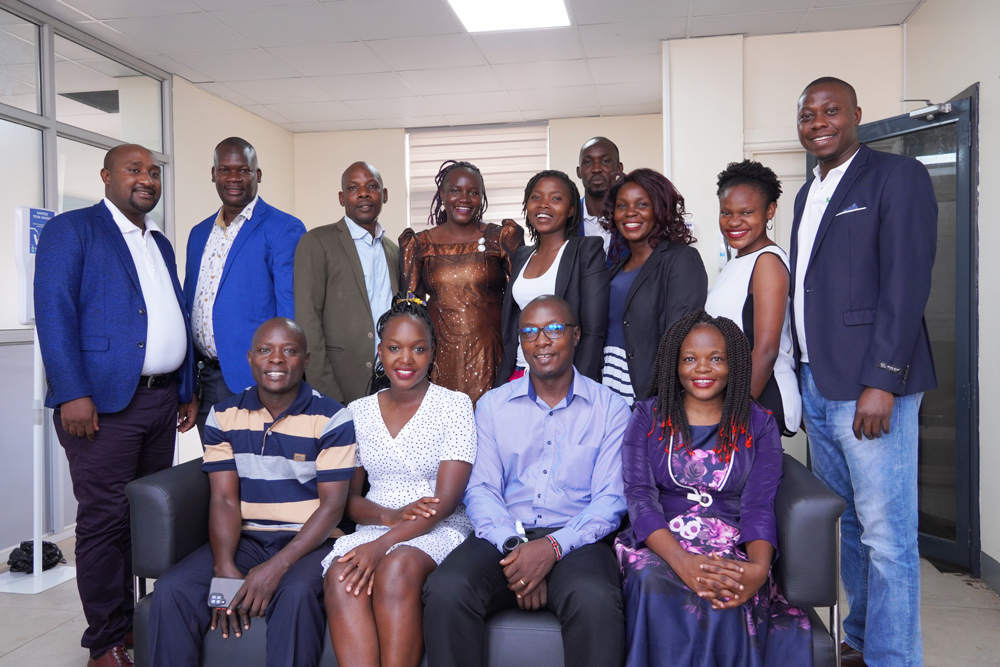 Photo of the staff at the Uganda office including Mr. Collins, sitting on the sofa.
Photo of the staff at the Uganda office including Mr. Collins, sitting on the sofa.
My message is simple, Believe in yourself, since with hard work nothing is impossible. When you work for companies, you grow with them. You may never realize the full potential you have if you don’t try, so stay focused.
Also, find someone who can guide you, they truly make a difference for your future. In my case, meeting my boss, Mr. Hojo, made it so.